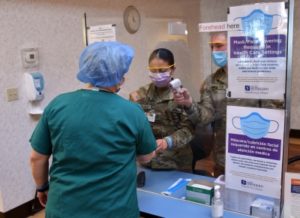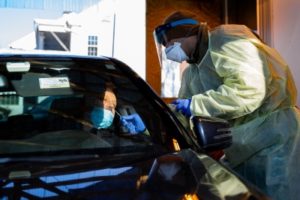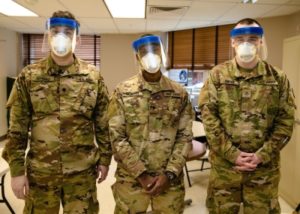
U.S. Army Pfc. Daria Sanchez and Pfc. Bradley Sample, Oregon Army National Guard, screen visitors arriving at Good Shepherd Medical Center in Hermiston, OR, in February. Nearly 1,200 soldiers and airmen were activated to assist hospitals across the state in non-clinical support roles due to increases in COVID-19 cases and staffing shortages. U.S. Air National Guard photo by 1st Lt. Morgan Lindsay
HARRISBURG, PA — For more than two years, the National Guard has risen to the challenges posed by COVID-19 as the pandemic has disrupted lives, supply chains, health care, education and more. While many units are now returning home after helping manage the omicron wave, others remain in the field helping hospitals, long-term care facilities and schools.
For the men and women of the National Guard, the recent missions have been very different from what they expected to do when they signed up and rewarding in unexpected ways. Some West Virginia units continued to support local hospitals into March. “Seeing the difference it makes for nurses in my hometown—who I have known my whole life—makes all the hard work of becoming a soldier worth it,” said carpentry and masonry specialist Kristen Denny of Martinsburg, WV. “I get to make a difference in my community by taking stress off the nurses, so they can focus on the actual medical care of patients.”
The Pennsylvania National Guard has supported more than 130 long-term care facilities. Medic Ha Thach has been on orders since December 2020. “It’s definitely not what I expected when I enlisted as a medic, but it’s been interesting,” Thach said. “I feel like it’s a different level of care based on what we were trained to do as combat medics. It definitely required a lot of people skills and social skills speaking with the residents, the nurses, the other staff. It’s been a great experience.”
Her colleague Matt Zechman, also a medic, has been on orders for a year. An experienced emergency medical technician, Zechman said administering more than 1,500 vaccines on his first mission “was the best time I ever had in the Army by far.” While assisting in long-term care facilities, he developed friendships with the seniors he was helping. “I’ve met some incredible residents,” he said. “I was doing Walmart runs for them to get them things they needed, and I actually have a pen pal now from one of the missions I was on. I’ve been writing her back and forth. Being able to meet some people and leaving there knowing that we absolutely made a difference has been great.”

U.S. Air Force Airman 1st Class Lewis Jump, cyber transport systems specialist assigned to the 103rd Air Control Squadron, 103rd Airlift Wing, Connecticut Air National Guard, administers a COVID test at a COVID-19 test site located at Yale New Haven Health Shoreline Medical Center in Guilford, CT, in February. U.S. Army photo by Sgt. Matthew Lucibello
The Utah National Guard stepped in to help local hospitals for the first time in February. Staffing shortages and the omicron surge put Intermountain Healthcare, a large regional network, in a critical situation. The system “reached out to ask if the Guard could help support some of the staff shortages the hospital is seeing as they have staff members out with COVID or if they’ve left the health care system because of the hard work they’ve done over the last two years,“ said Lt. Col Erick Wiedmeier, commander of the Utah National Guard COVID-19 Joint Task Force.
“At first, it’s a little daunting not having any medical experience, but after the training, it was a pretty proud moment to be able to know that if needed, we could help in the facilities that we were being asked to help in,“ said Sgt. Bracken McKinlay, one of the Utah National Guard soldiers who served at Intermountain’s St. George Regional Hospital.
That willingness to step up when and where needed has provided essential emotional support to the physicians and nurses exhausted by the pandemic. “It makes a huge difference to know that we’re not forgotten, and our teams are not forgotten,“ said Mark Evans, St. George’s operations officer. “We’re extremely grateful for this opportunity to partner with the Guard. Our staff is excited to have them here.“
In Oregon, 1,200 Guard members helped hospitals across the state expand their capacity during the latest surge. “Think about filling a glass of water. You reach a point where it starts overflowing and you can’t put any more into it,” said Brig. Gen. Donna Prigmore, commander of the Oregon Air National Guard. “We’ve come close two times now in terms of that being the case for accessibility to hospitals, and a lot of people have no idea how close to dire it has become.”

Three combat medics with the 1st Battalion, 175th Infantry Regiment Headquarters and Headquarters Company, Maryland Army National Guard, pose for a photo at Johns Hopkins Hospital in Baltimore, MD, in February. Up to 1,000 MDNG members were activated to assist state and local health officials with their COVID-19 response to include the distribution of COVID-19 test kits, 20 million KN95 and N95 masks, and other personal protective equipment and to provide support to skilled nursing facilities, hospitals, and testing sites. U.S. Army National Guard photo by Spc. Tom Lamb
For Devin Kentwallace, an aerospace medic with New Hampshire National Guard’s 157th Air Refueling Wing, greeting hospital visitors, administering vaccines and setting up temporary hospitals has kept her busy since she finished basic and technical training just before her unit helped with the initial vaccine rollout in early 2020. The work pairs well with her career plans, as she enlisted to help pay for nursing school and takes online classes while she serves.
The career benefits are only part of the reason she enjoys her missions, though. “Going to school, being away from family and trying to balance everything can be tricky,” Kentwallace said. “Honestly though, putting on the uniform, going out into the world and helping people has been the most rewarding thing.”
Expressing the sentiment of many governors, hospital administrators, health care workers and patients across the country, Maine Gov. Janet Mills thanked the National Guard “for their heroic and compassionate work” supporting health care works and the people of her state. “Each of you has stepped up to meet this unique and unprecedented challenge with fortitude, full hearts, and an unwavering dedication to the health and welfare of Maine people. We are immensely grateful for all that you have done and for the sacrifice of your families and your employers.”
